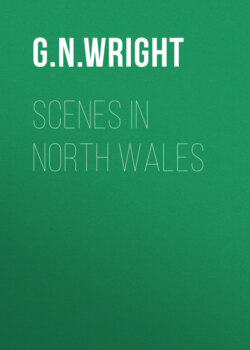Читать книгу Scenes in North Wales - G. N. Wright - Страница 3
На сайте Литреса книга снята с продажи.
PREFACE.
ОглавлениеTable of Contents
There is a local interest attached to mountain scenery, arising not only from a natural concentration of grand and majestic objects, but also from a spirit of independence and ardent love of liberty with which the mountaineer, invariably, seems to be inspired.
The great deeds of Leonidas were done amidst the rocks and glens;—Switzerland displays her hatred of tyranny in an undying affection for the memory of Tell;—while from the chivalrous exploits of Glandwr, brandishing high the torch of liberty, a stream of light has issued, that seems to have poured its rays into the deepest recesses of his native glens.
The demi-anarchy of the feudal system occasioned the erection, in Gwynedd, of many stately castles, whose lonely ruins now adorn the petty kingdoms they once overawed. And in the violent struggles of the ancient Briton to preserve his wild home from Saxon intrusion, originated those yet more splendid palaces, that illustrate like monuments, or like medals, the history of those periods in which they were erected.
Notwithstanding the great power by which the Cambrians were overthrown, and the healing measures subsequently pursued to obtain a willing submission to their conquerors, the draught appears to have been imbittered by the introduction of some ingredient not easily detected by historical analysis; for, as a people, the ancient Britons are still totally distinct from the parent state in customs, manners, dress, in feelings, and in language. The tenacity with which they adhere to their primitive tongue, tends to a dissociation from the greater part of the empire, and contributes to the preservation, by intermarriages amongst themselves and otherwise, of a state of society peculiar and extraordinary as existing in the very bosom of the British isles.
The Isaurians were a small nation in the heart of the Roman empire; they dwelt among mountains; they saw civilization on every side, yet they rejected it with scorn, and, on occasion, found employment for the legions through several ages.
The Cambrians have not despised civilization, but have rather so engrafted it upon the ancient stem, that the variation in the tree is scarce perceptible. The fruit however proves fair and wholesome. A nation is produced, of such proverbial gentleness, that although the envious attribute it to the obscurity of their abode, the legislature must appreciate the moral value of subjects who are honest from a love of justice, and governed without expense.
To illustrate the scenery of a country possessing so large a portion of natural beauty, abounding in so many records of eminent persons and remarkable events, and occupied by a peasantry peaceful, innocent, and happy, presents a favourable opportunity for the production of a work both of amusement and interest. If these ends shall not have been happily attained, there is still one more valuable recommendation in reserve, that is, the moral tendency of the whole.
The inhabitants of North and South Wales are to be considered as quite distinct. They speak different dialects of the ancient language, are sprung from a different ancestorial stock, and, in the Southern half of the principality, the arts and manufactures of England are introduced and cultivated with the most entire success.
The selection and arrangement of the graphic illustrations, which precede each historic sketch, are influenced by two circumstances. First, a desire to include scenes intimately connected with the most interesting periods of local history, and, secondly, a wish to introduce a number of picturesque views sufficient to convey a distinct idea of the peculiar features of a country so romantic.
Notwithstanding the small cabinet size to which public convenience limits each delineation, truth and expression will uniformly be found associated, accompanied also by a clearness rarely attained in engravings executed on such a miniature scale.
